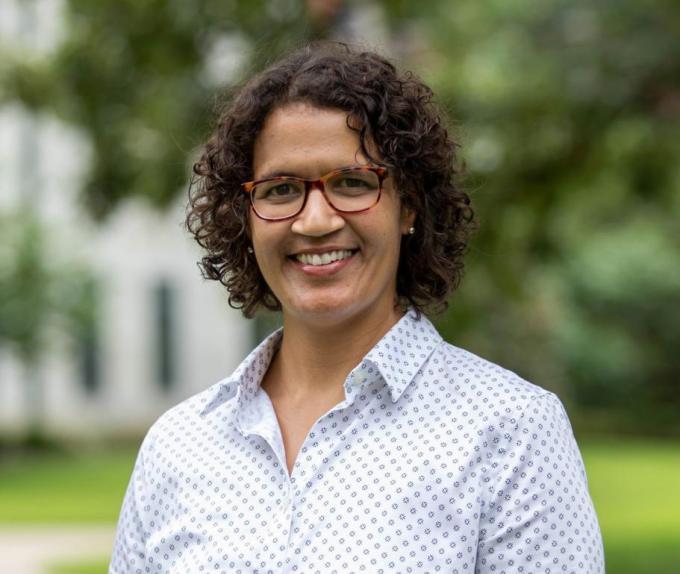By Richard LeComte
 The University of Kentucky Board of Trustees has named Kristin V. Monroe, associate professor of anthropology in the College of Arts & Sciences, as the new Hajja Razia Sharif Sheikh Islamic Studies Professor.
The University of Kentucky Board of Trustees has named Kristin V. Monroe, associate professor of anthropology in the College of Arts & Sciences, as the new Hajja Razia Sharif Sheikh Islamic Studies Professor.
Dr. Hamid Hussain Sheikh, Sr., a retired obstetrics and gynecology specialist, and Amy Lee Sheikh of Lexington, created the professorship in memory of his mother, Hajja Razia Sharif Sheikh. A native of Lahore, Pakistan, Hajja Sheikh was active in her community and a leader in her faith. In addition to the professorship, the Sheikh family has supported a scholarship and the Hajja Razia Sharif Sheikh Islamic Studies Lecture, which Monroe will supervise.
"I am very honored to accept this professorship given in the name of Hajja Razia Sharif Sheikh and I am grateful to the Sheikh family for their support for the scholarly study of Islam and Muslim-majority societies at the University of Kentucky,” she said. ”Efforts like theirs help to build and expand understanding of cultural and religious differences."
Monroe’s research has focused on experiences of mobility, political violence and citizenship in Beirut, Lebanon, in both historical and contemporary eras. Her current investigations, supported by the Wenner-Gren Foundation for Anthropological Research, explore labor and migration among Syrians during the country's long war.
In her book, “The Insecure City: Space, Mobility, and Power” (Rutgers University Press, 2016), Monroe shows how practices of spatial mobility in the city do more than reflect social differences; they also produce an uneven and insecure urban citizenship. The volume was included in the Knowledge Unlatched open access program, and she received support for writing the book from the Career Enhancement Fellowship of the Woodrow Wilson National Fellowship Foundation.
During her career, Monroe served as a Visiting Research Scholar with the Islamic Bioethics Project at Georgetown University in Qatar from 2017-2018 and published the findings from this research in a book chapter “Reproductive Technologies in Muslim Contexts” in the “Handbook of Contemporary Islam and Muslim Lives” (Springer, 2019). At UK, she mentors numerous undergraduate students and doctoral scholars, several of whom have received National Science Foundation dissertation fellowships.
In addition, she has served on the board of the American Anthropological Association’s Middle East Section and is invited regularly to present at international venues. She holds a doctorate from Stanford University.
Hajja Razia Sheikh (1920-89), a mother of eight with a passion for helping the less fortunate. Her family has established endowments and trusts so that her legacy will live on through helping others and educating university students about Islam. Born in Lahore, she had no formal schooling and learned the Quran and Islam at home. A firm believer in education, she made sure that all of her children were highly educated. Three became physicians. A brave woman, she did not let her disabling stroke deter her from performing Hajj.
